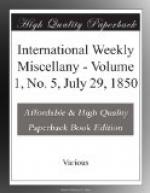Two episodes interrupted the polemical disquisition. In character none could be more different—the one eventuated in a clean knock down—the other decided indirectly my future fortunes—and, in the next chapter, both shall be detailed.
* * * * *
CHAPTER II.
“Antonio. Thou knowest
that all my fortunes are at sea;
Nor have I money or commodity,
To raise a present sum.”
Merchant of Venice.
The Boheeil Kistanaugh, called in plain English, the kitchen boy, had entered, not like Caliban, “bearing a log,” but with a basket full. He deposited the supply, and was directed by the commander to replenish the fire. I believe that Petereeine’s allegiance to my father originated in fear rather than affection. He dreaded
“the deep damnation of his ‘Bah!’”
but what was a still more formidable consideration, was a black-thorn stick which the colonel had carried since he gave up the sword; it was a beauty, upon which every fellow that came for law, in or out of custody, lavished his admiration—a clean crop, with three inches of an iron ferule on the extremity. My father was, “good easy man,” a true Milesian philosopher—his arguments were those impressive ones, called ad hominem, and after he had grassed his man, he explained the reason at his leisure.
Petereeine (little Peter), as he was called, to distinguish him from another of that apostolic name—who was six feet two—approached the colonel in his best state of health with much alarm; but, when a fit of the gout was on—when a foot swathed in flannel, or slippered and rested on a hassock, announced the anthritic visitation, Petereeine would hold strong doubts whether, had the choice been allowed, he should not have preferred entering one of Van Amburgh’s dens, to facing the commander in the dining-room.
Petereeine was nervous—he had overheard his master blowing to the skies the Reverend George Cantwell, and the red-headed rector, Paul Macrony. If a parson and a priest were so treated, what chance had he? and great was his trepidation, accordingly, when he entered the state chamber, as in duty bound.
“Why the devil did you not answer the bell? You knew well enough, you incorrible scoundrel! that I wanted you.”




